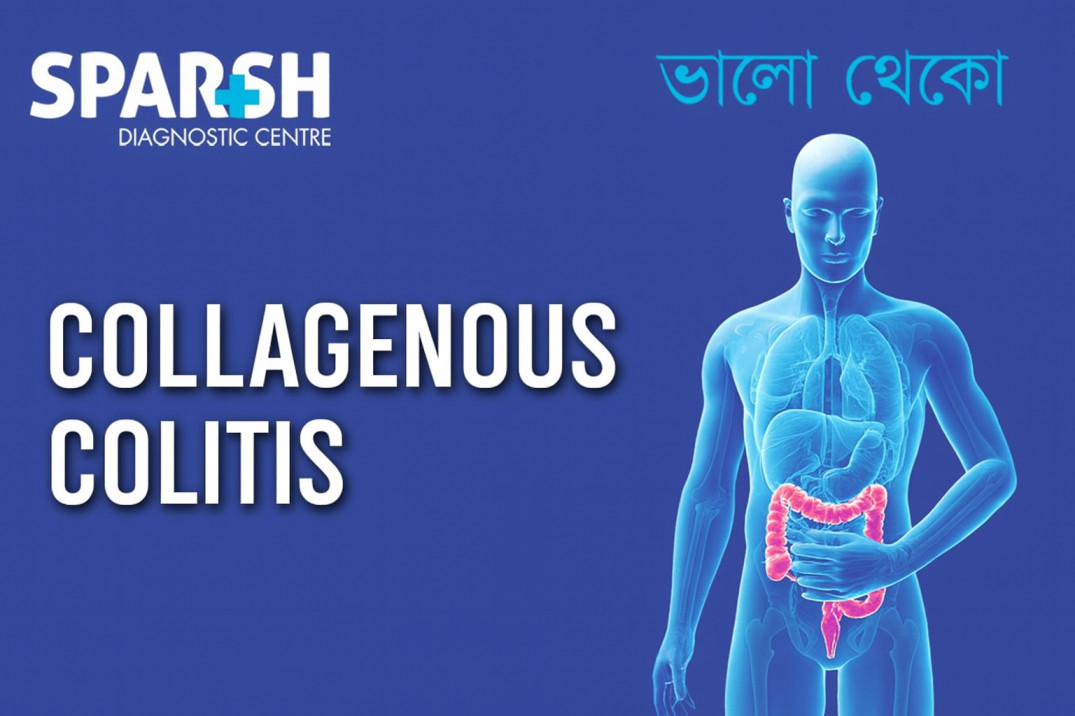Collagenous colitis is an inflammatory bowel condition that falls under the category of microscopic colitis. Although it causes chronic, persistent diarrhea similar to other gastrointestinal disorders, it is unique because the inflammation is only visible under a microscope. This often leads to delayed diagnosis and ongoing discomfort for patients.
Named after the thickened layer of collagen found beneath the lining of the colon, collagenous colitis primarily affects middle-aged and older adults—especially women. Despite its challenging symptoms, the condition is treatable, and most people can live a normal, healthy life with appropriate care.
In this comprehensive guide, we explore the causes, risk factors, symptoms, diagnosis, and treatment options for collagenous colitis, along with lifestyle recommendations to manage flare-ups effectively.
What is Collagenous Colitis?
Collagenous colitis is a type of inflammatory bowel disease classified under microscopic colitis. The hallmark feature of this condition is the presence of a thickened collagen band—typically more than 10 micrometres—beneath the epithelial lining of the colon. This thickening leads to inflammation and chronic watery diarrhea, but unlike ulcerative colitis or Crohn’s disease, the colon appears normal during colonoscopy.
Because the inflammation is microscopic, biopsies are essential for diagnosis.
Although the exact cause remains unknown, collagenous colitis is believed to be triggered by a combination of immune system activity, medications, infections, genetics, and environmental factors.
Causes & risk factors of Collagenous Colitis
Collagenous colitis does not have one definitive cause. Instead, several factors contribute to its development:
1. Autoimmune Activity
The immune system may mistakenly attack the lining of the colon, leading to inflammation. Collagenous colitis is more common in individuals with autoimmune diseases such as:
2. Medications
Certain drugs are strongly associated with triggering microscopic colitis:
Proton pump inhibitors (omeprazole, pantoprazole)
SSRIs
Beta-blockers
Statins
These medicines may irritate the colon lining, making it more prone to inflammation.
3. Hormonal Factors
Women, particularly those aged 50 and above, are more affected. Hormonal changes such as menopause or hormone replacement therapy may increase risk.
4. Infections
Bacterial or viral infections can trigger inflammation in the digestive tract, potentially leading to collagenous colitis.
5. Smoking
Research suggests a strong association between smoking and microscopic colitis. Smokers tend to develop symptoms at a younger age and experience more frequent flare-ups.
6. Genetic Influences
Family history may play a role, though no specific gene has been identified.
Symptoms of Collagenous Colitis
The symptoms can vary from person to person, but the most common include:
1. Chronic Watery Diarrhea
This is the hallmark symptom. Patients may experience:
5 to 20 bowel movements per day
No blood in stool
Night-time diarrhea
2. Abdominal Pain & Cramping
The inflammation irritates the colon, causing spasms and pain.
3. Urgency and Incontinence
Sudden urges to use the toilet may interfere with daily activities.
4. Unintended Weight Loss
Rapid bowel movements can prevent proper absorption of nutrients.
5. Fatigue
Due to dehydration, electrolyte imbalance, and disrupted sleep.
6. Bloating & Gas
Inflammation triggers increased gas production in some individuals.
7. Nausea
Though less common, nausea may accompany severe flare-ups.
Symptoms may come and go, with periods of remission lasting weeks or months. Some individuals experience persistent symptoms requiring long-term management.
How is Collagenous Colitis diagnosed?
A detailed history, physical exam, and laboratory tests help rule out other gastrointestinal conditions. Key diagnostic steps include:
1. Stool Tests
Used to rule out:
Infections
Parasites
C. difficile
Inflammatory markers
2. Blood Tests
These tests check for:
Vitamin deficiencies
Autoimmune markers
3. Colonoscopy with Biopsy (Gold Standard)
Although the colon may appear normal visually, tissue samples taken during colonoscopy reveal:
Thickened collagen layer
Inflammatory cells
Characteristic histological findings
This step is essential for confirming the diagnosis.
4. Imaging
Rarely needed unless complications are suspected.
Treatment options for Collagenous Colitis
Treatment focuses on reducing inflammation, controlling diarrhea, and improving quality of life. Management is often tailored to the severity of symptoms.
1. Medication Adjustments
If medications such as NSAIDs or PPIs are suspected triggers, doctors may recommend stopping or substituting them.
2. Antidiarrheal Drugs
These help reduce stool frequency:
Loperamide
Bismuth subsalicylate
3. Budesonide (First-Line Treatment)
Budesonide is a steroid that works locally in the intestines with fewer systemic side effects. It is highly effective in inducing remission.
4. Corticosteroids
Prednisone may be used in severe cases unresponsive to budesonide.
5. Immunosuppressive Drugs
For persistent or refractory cases:
Azathioprine
6-mercaptopurine
Methotrexate
6. Biologic Therapy
In rare, severe cases:
Anti-TNF agents
Vedolizumab
These are reserved for patients not responding to conventional treatment.
7. Antibiotics
Used occasionally if bacterial overgrowth is present.
8. Surgery (Very Rare)
Surgery is rarely required and is considered only when:
Symptoms are unmanageable
Other conditions coexist
Severe complications occur
Diet & lifestyle tips for managing Collagenous Colitis
Lifestyle changes can significantly help control symptoms and prevent flare-ups.
1. Follow a Low-Fat Diet
High-fat foods may worsen diarrhea.
2. Limit Dairy
Lactose intolerance is common during flare-ups.
3. Avoid Gluten (If Sensitive)
People with celiac disease or gluten sensitivity may benefit from gluten-free meals.
4. Drink Plenty of Fluids
To prevent dehydration, include:
Electrolyte drinks
Coconut water
Avoid caffeinated and carbonated beverages.
5. Quit Smoking
Stopping smoking has been shown to reduce flare-ups and improve long-term outcomes.
6. Reduce Alcohol
Alcohol can irritate the digestive tract.
7. Manage Stress
Stress can worsen inflammation. Beneficial activities include:
8. Keep a Food Diary
This helps identify trigger foods.
Long-Term Outlook
Most individuals respond very well to treatment, especially with budesonide. Many experience prolonged periods of remission. However, the condition can be chronic with recurring symptoms, making regular follow-up and lifestyle management crucial.
With proper treatment, collagenous colitis does not increase the risk of colon cancer, which provides reassurance for patients managing this condition.
FAQ Section
1. Is collagenous colitis a serious condition?
While it can significantly impact daily life due to chronic diarrhea, it is usually manageable with medication and lifestyle changes and rarely leads to severe complications.
2. Can collagenous colitis go away on its own?
Some people experience spontaneous remission, but many require treatment to control symptoms and maintain quality of life.
3. What foods should be avoided?
Avoid high-fat foods, spicy foods, caffeine, alcohol, artificial sweeteners, and dairy (if intolerant). Keeping a food diary helps identify personal triggers.
4. Is collagenous colitis the same as Crohn’s disease?
No. Although both cause inflammation, Crohn’s disease affects deeper layers of the bowel and can be seen on imaging or colonoscopy, while collagenous colitis affects only the lining and requires microscopic examination for diagnosis.
5. Does stress cause collagenous colitis?
Stress does not directly cause the condition but can worsen symptoms or trigger flare-ups.
6. Can it be cured?
There is no permanent cure, but symptoms can be controlled effectively with medication, diet, and lifestyle management.
7. Is collagenous colitis hereditary?
There is no clear genetic link, but a family history of autoimmune diseases may increase susceptibility.
To consult a Gastroenterologist at Sparsh Diagnostic Centre for treatment of Toxic Megacolon, call our helpline number 9830117733.
#BhaloTheko
Disclaimer:
No content on this site, regardless of date, should ever be used as a substitute for direct medical advice from your doctor or other qualified clinician.

![]()






[…] Collagenous ColitisChronic inflammation of the colon’s connective tissue can, in rare cases, lead to Toxic Megacolon. […]